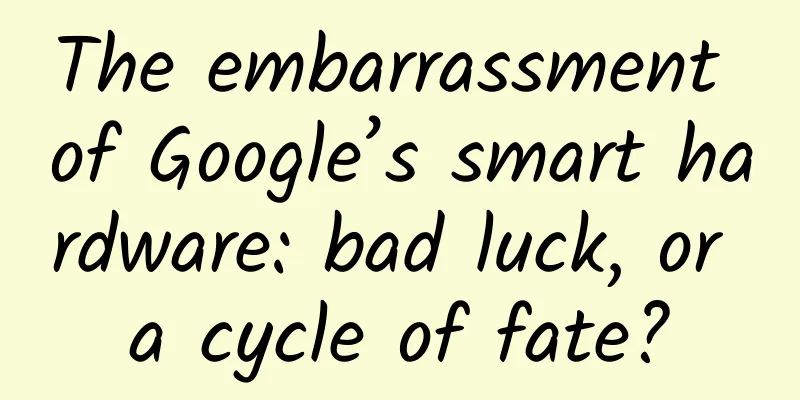The embarrassment of Google’s smart hardware: bad luck, or a cycle of fate?

|
Do you still remember Google Glass ? This smart hardware launched by Google in 2012 directly triggered a new wave of wearable smart devices. This "rich man's toy" priced at more than 10,000 yuan is no longer a concept prototype product of that year. It has been put on the market for sale, but it is still hidden in the deep boudoir of Google and no one is interested in it. (Google Glass, Google's once groundbreaking project in the field of smart hardware, is now only a toy for the rich) The fantastic products created by Google engineers in their "20% free time" are far more than just whimsical experimental products like Google Glass. In 2011, it acquired Motorola Mobility for a whopping $12.5 billion, and sold it to Lenovo at a discount for $2.91 billion the following year . In addition to manufacturing smart glasses and mobile phones, it also provides services such as biotechnology, military robots, quantum computers, high-altitude balloon base stations, driverless cars, submarine gigabit optical fibers, and global map services. Some people wonder if Google's series of smart hardware is going to be a success? On the other hand, the market performance of Google's hardware projects is as cold and brutal as a glacier: its hasty entry into the mobile phone manufacturing industry and acquisition of Motorola Mobility in 2011 left it with billions of dollars in losses, and it had to sell off this "hot potato". What is bleak is not only the financial losses brought by Google's hardware project, but the bigger question is: Why is Google, which has always played a "high-end" image in software, search, advertising and other fields, never down to earth? Could it be that Google is destined to lack some kind of hardware gene? (The social war between Google and Facebook in 2010 ended with Google’s complete defeat) Why is Google's hardware plan so radical? - Google's crisis Why has Google been so aggressive in promoting its series of smart hardware plans in recent years? Could it be that this high-tech company founded in 1998 is also experiencing its "midlife crisis"? That's right. In recent years, brothers Brin and Page have been a little annoyed. Nearly 20 years after its founding, Google, which seemed to be so prosperous on the outside, has become like a middle-aged man in his 50s. His body has become bloated, his hair has become increasingly sparse, and he has begun to have endless troubles. In the ever-changing Internet industry, Google, which is about to turn 20, is indeed too old. As early as 2010, Google CEO Schmidt mentioned his expectations for Google's future in a speech: "Search will eventually not only search for web pages, but also personal emails, music, topics of interest and other information, becoming a personal search." However, in the two trends of transformation from the Internet of information to the Internet of people, and from the PC Internet to the mobile Internet, Google executives including Schmidt have tasted the harsh reality. Do you remember the fierce battle without gun smoke in the fall of 2010 four years ago? When Google faced the then rising Internet star Facebook (which had more than 500 million active users at the time), facing Google's machine "crawlers" extending their tentacles into the social field, Zuck firmly said "NO" and refused Google to obtain personal user information from Facebook through its search engine. The "social war" ended with Google's complete defeat. Following the failure of Wave, Google's first social product in 2009, Vic Gundotra, the vice president in charge of Google+, left the company in 2013 after eight years of fighting in the social field. To this day, Google's transformation to the "Internet of People" can only be regarded as a "half-finished project." After the complete failure of its social transformation, Google's other transformation in mobile strategy was also a failure. In 2010, Google launched its first "Google Phone" product, Nexus One, which ended in failure. In addition, the full acquisition of Motorola Mobility in 2011 failed. Google's mobile war was not successful at the outset, but it was already scarred. What is even more frightening is that today, Google's former rival Facebook is also losing its glory in the mobile field, losing to newer mobile Internet stars like the photo-sharing service Instagram. As the "grandfather" of the "grandfather", Google looks around and can't even find its target. What is even more cruel than the "information island" is the complete "chilling teeth". In desperation, Google engineers turned to "weird" products like Google in their 20% free time. Regardless of which is bigger, losing something in one place but gaining something in another can be considered a kind of self-consolation among the various preparations Google has made for the future. (Google's high-altitude balloon base station is the most amazing!) Where are the boundaries of Google's economies of scale? Ever since Google surpassed Yahoo to become the world's largest search engine in 2000 and launched the AdWords advertising system, it has been careful to maintain the effective boundaries of its economies of scope - essentially, it is just a media company, although the way it obtains advertising revenue is different from traditional media. The essence of economies of scope is that service providers provide different types of products and services to their core users. Because these products and services are synergistic and mutually supportive, they can help manufacturers lock in users and provide users with more and better service experiences while reducing the total cost of products and services, thereby creating a spillover effect in service value. Starting around 2003, Google began to avoid the risk of over-reliance on the search engine business through a large number of acquisitions, and the first field it entered was the quasi-media business. Among them, the acquisition of the blog technology tool Blogger.com in 2003, the acquisition of the photo management software Picasa and the digital map and satellite imaging company Keyhole in 2004, the acquisition of the then largest video sharing website Youtube for US$1.65 billion in 2005, the acquisition of the online advertising service company Doubleclick for US$3.1 billion in 2007, and the launch of the browser Chrome in 2010 are all notable examples. Among them, the latter two large-scale acquisitions have further consolidated Google's "search + media" king status. In addition to the upstream media business, Google also began to enter the field of underlying infrastructure such as network communications in 2010. In 2012, Google began to lay a gigabit fiber broadband network between two cities called Kansas City in Kansas and Missouri in the United States. Google knows that users' smooth Internet experience based on the network is also inseparable from fast and convenient broadband. It is said that after the super high-speed fiber with a speed of up to 1Gbps is laid, the user's download speed will be about 100 times faster than the current high-speed connection download speed of ordinary home users! In the United States, more than 1,100 cities have applied to Google to participate in Google's gigabit "community fiber" project. (Except for reliable projects such as fiber-optic communications and high-altitude balloon base stations, many hardware development plans are actually unreliable in many smart hardware projects that have long been beyond the scope of Google's economy.) Since 2008, Google has invested in several trans-Pacific submarine cable systems connecting Southeast Asia and Japan, and the United States and Japan (the latter is called UNITY and was put into use in 2010). In 2014, it will also participate in the construction of a $300 million Pacific submarine cable system called "FASTER" to connect several cities between Japan and the United States. In addition to media, and fiber-optic communications, Google has also focused on entering the fields of economies of scale in recent years, including mobile Internet and smart hardware. The acquisition of mobile phone software Android in 2005, the acquisition of Spanish photo sharing website Panoramio in 2007, and the full acquisition of Motorola Mobility in 2011 are all classic cases in this regard. Google's high-altitude balloon base station (Project Loon) is even more regarded as its masterpiece. If Google's mission when it was founded 16 years ago was to "organize the world's information and make it universally accessible and useful", then Google's "Cloud WIFI" mission is to "let the proletariat of the world reunite through ubiquitous, free WIFI!" Compared with Google's massive offensive in software and services, Google's entry into many smart hardware fields including Google Glass, mobile phone manufacturing and smart home has, in a sense, already exceeded its defined economic boundaries. In fact, Google has become an all-encompassing venture capital company that "scatters sesame seeds everywhere" in the hardware field, and it keeps fighting despite repeated failures. Take Google Glass as an example. This perverted invention that is most suitable for "peeping kings" is not only expensive, but also lacks application scenarios. It can only serve as a toy for local tyrants, a pretentious set for digital product enthusiasts, developers and those who like to show off, but is not included in the shopping list of ordinary users. One conceivable application scenario is that in the future, Google will embed an RFID (radio frequency identification technology tag) on the back of the head of every person on earth. In this way, with Google Glass, you can immediately judge everyone's ID, age, love history, income and other special habits on the street. Of course, the prerequisite is that everyone who wears Google Glass can first be exempted from the punishment of easily causing traffic accidents. To this day, Google still doesn't know what to do with this precious thing. The latest rumor is that it is to be integrated into Google Wallet - another fantasy story! In addition to the embarrassment Google has encountered in the manufacture of mobile phones and smart hardware such as Google Glass, the outside world is not optimistic about Google's acquisition of smart home device manufacturer Nest for $3.2 billion in January 2014. Although smart homes sound great, the application scenarios for ordinary users are far from appearing. Google has even more bizarre and bizarre products to come. From the military project four-legged robot Boston Dog, the smart contact lens for blood sugar detection, the "immortality" project funded by the life science company Calico, to the Tango mobile phone that builds a three-dimensional space map, quantum computers, single-person backpack street view shooting equipment Trekker, modular mobile phones and driverless cars... Among the many hardware projects, some projects (such as the high-altitude balloon base station and the single-person backpack street view shooting equipment Trekker) are full of fantastic ideas and have very reliable application scenarios, while most of them have nothing to do with Google's "scope" and can only be regarded as aimless graffiti by Google engineers in their 20% free time. The deeper question is: extending from the unique algorithm of Brin and Page back then, is Google essentially a high-tech company that lacks hardware genes? If you don't believe it, it's not difficult to glimpse one or two of the mysteries by looking at its future reference species Microsoft. Want to learn from Steve Jobs? Don’t forget the 7 big buns above (Apple TV was a project that Steve Jobs couldn’t let go of before his death, but its future is still unclear) Some people also believe that Google's investment in the smart hardware field in recent years is purely due to the stimulation from Apple. Let's go back to 2005. After more than ten months of fierce battle in the corner of Building 44 at Google headquarters, Google's Android team never dreamed that the iPhone launch on January 9, 2007 would be a perfect "killer move" for Google. If the birth of iPod in 2001 showed Jobs' outstanding marketing talent - he was even able to convince New York's stubborn record industry giants to support digital music, then the emergence of iPhone fully demonstrated the effectiveness of Apple's "soft and hard approach" in swallowing seven buns under Jobs' leadership - as for the eighth bun, iPhone, it made Apple far ahead of Google, leaving more than 40 Android development engineers in Building 44 of Google in complete despair. Before the iPhone came out, although Jobs had been mocking the ugliness of PCs based on the Wintel architecture, he and his team had also experienced the pain of failure: the Apple III, a commercial computer in 1981, the expensive Lisa, a commercial computer in 1983, the NeXT, a workstation computer in 1989, the Puck Mouse in 1998, the high-priced The Cube in 2000; the first mobile phone, the iTunes phone in 2005, and the Apple TV in 2007, were all the "seven buns" that Jobs and his team had to swallow with bitterness. (In 2011, Apple's market value exceeded Google's by 80%. Three years later, the gap has not changed much.) It just so happened that Brin, Page and their R&D team were amazed at the fullness of Apple's eighth steamed bun - the second spring brought to Apple by the iPhone, and completely ignored their own strengths and weaknesses. In 2005, the market value of Apple and Google was about 360 billion US dollars and 200 billion US dollars respectively, with the former exceeding the latter by 80%. By October 2014, the market value of Apple and Google was 609.1 billion US dollars and 379.3 billion US dollars respectively (data as of October 10, 2014). Apple is still far ahead, and don't forget that Apple is 37 years old and Google is only 16 years old! Between reaching the sky and standing on the ground, Google has not been able to avoid putting itself in the awkward position it is in today. 16 years ago, Google was in great shape and was born with a silver spoon in its mouth. Now, Facebook, Google's former idol, is already old! Apple, the former big brother, has hundreds of millions of mobile phone users because of its layout of mobile Internet, while Google can only open up new horizons in the field of smart hardware and try its luck. But it is difficult to get down to earth. Is this bad luck? Or is it the reversal of fate? As a winner of Toutiao's Qingyun Plan and Baijiahao's Bai+ Plan, the 2019 Baidu Digital Author of the Year, the Baijiahao's Most Popular Author in the Technology Field, the 2019 Sogou Technology and Culture Author, and the 2021 Baijiahao Quarterly Influential Creator, he has won many awards, including the 2013 Sohu Best Industry Media Person, the 2015 China New Media Entrepreneurship Competition Beijing Third Place, the 2015 Guangmang Experience Award, the 2015 China New Media Entrepreneurship Competition Finals Third Place, and the 2018 Baidu Dynamic Annual Powerful Celebrity. |
<<: Samsung faces a lame situation: mobile phone addiction drags down performance
>>: iPod is on the decline. Can smart speakers take over?
Recommend
The industry marketing strategy that took 5 years to compile is given to you!
The home improvement industry is at a turning poi...
As a developer, how do you think Apple should improve its developer tools?
[[164459]] My colleague Alex Denisov and I have d...
Why don't woodpeckers get concussions? You think they have shock absorbers, but they're actually hammers
Woodpeckers peck at extremely high speeds and fre...
Taking Meituan Takeaway’s personal report as an example, let’s talk about user personal behavior reports!
We try to reflect the value of our product throug...
How to dial 400 from a mobile phone? How to dial a number starting with 400 from a mobile phone?
400 telephones are becoming more and more common ...
Is it better to eat Cordyceps sinensis as a whole or individually? How to eat Cordyceps sinensis best?
Our friends all take Cordyceps sinensis regularly...
Experience sharing on project development by leveraging strengths and weaknesses
[[228468]] The operation of a project should be o...
Skim milk vs. whole milk, which one is healthier? It turns out that many people are not drinking it right
During festivals and gatherings with friends Many...
Why do some people get diarrhea after drinking milk? It turns out that this is the "trouble"
Many people have had this experience: bloating or...
Why are the seats in the subway designed to be slippery?
One minute with the doctor, the postures are cons...
What are the functions of the flower group buying mini program? How much does it cost to develop a flower shop mini program?
Every time a festival comes, many people will buy...
Interpretation of the 2018 Mobile App Advertising Data Year-end Report!
Public data shows that global mobile application ...
A new definition of use it or lose it: Is AI reshaping the human brain?
Technology is quietly changing the structure of o...
This carcinogenic toxin exists in every home! When cleaning, you must pay attention to these 3 places!
How often do you clean your house? Once every two...
"Singles' War" He Jiong and Cen Junyi: This is a breath of fresh air among dating shows
After watching old-fashioned blind date shows lik...









